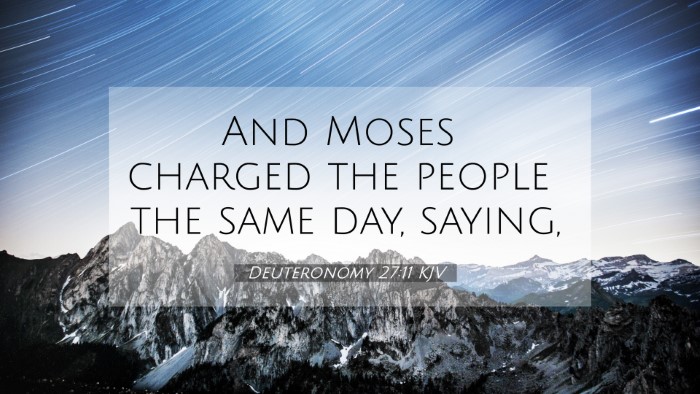Understanding Deuteronomy 27:11
In Deuteronomy 27:11, the verse states:
"And Moses charged the people the same day, saying,"
This verse occurs in a significant context within the Pentateuch, where Moses is delivering the laws to the Israelites as they prepare to enter the Promised Land. This particular moment emphasizes Moses’ role as the mediator between God and the people, reiterating important commandments that the Israelites are to uphold in their covenant with God.
Summary of Insights from Public Domain Commentaries
Matthew Henry's Commentary
Authority in Deliverance: Henry emphasizes that Moses’ charged address was not merely an obligation but a necessity for the people’s spiritual welfare. It showcases the authority Moses held as a leader, tasked with ensuring that the Israelites would remember and adhere to God's commandments.
Preparation for Commitment: This verse signifies a pivotal moment of preparation, where Moses is setting the stage for commitment to God's covenant. It indicates that the people are to respond with obedience as they transition into the new land.
Albert Barnes' Notes
Contextual Importance: Barnes notes the importance of context in understanding this exhortation. Verses like this lead into a series of curses and blessings that will follow, highlighting the consequences of obedience and disobedience.
Focus on Collective Responsibility: Barnes points out that the command is not just to individual Israelites but a collective charge for the nation as a whole, indicating that their unity under God's law is essential for their future in Canaan.
Adam Clarke's Commentary
Moses as a Teacher: Clarke focuses on Moses’ role as a teacher to the people. His delivery of these commands is likened to that of a father teaching their children, underlining the relationship built on love and responsibility.
Instructional Purpose: The verse serves an instructional purpose, as Moses implores the people to heed these commands seriously, reinforcing the value of obeying God’s word as they confront new challenges ahead.
Bible Verse Cross-References
To better understand the implications of Deuteronomy 27:11, we can examine several related verses:
- Exodus 19:8: The Israelite's commitment to obey God's covenant.
- Joshua 1:16-18: The response of the people to Joshua's leadership following Moses.
- Leviticus 26:3-13: God's promises contingent upon the people's obedience.
- Deuteronomy 6:4-9: The importance of teaching God's commandments to the next generation.
- Joshua 24:24: Israel’s obligation to serve the Lord and adhere to His commands.
- 1 Corinthians 10:11: The application of Israel's history as a warning for New Testament believers.
- Romans 10:17: The necessity of hearing the word for faith development.
- Hebrews 4:2: The word preached must be acted upon for it to be effective.
- James 1:22: The call to be doers of the word and not just hearers.
Thematic Bible Verse Connections
This verse relates to several themes found throughout Scripture:
- Obedience to God: Continually emphasized from the Old Testament to the New Testament.
- Covenant Relationship: The ongoing dialogue about what it means to be chosen by God.
- Leadership and Responsibility: The role of leaders in guiding their communities toward faithfulness.
- Collective Worship: The significance of community in worship and adherence to God's law.
- Consequences of Instruction: Many verses reflect on blessings for obedience and curses for disobedience.
How to Use Bible Cross-References
Utilizing a Bible concordance or Bible cross-reference guide can provide deeper insight into verses like Deuteronomy 27:11. Here are some tools and methods:
- Bible Concordance: Helps locate specific words and phrases across scripture.
- Cross-Reference Systems: These can guide your understanding of how different verses relate thematically.
- Bible Software: Digital tools that offer cross-referencing capabilities for easier navigation.
- Study Bibles: Many editions provide helpful annotations and cross-references directly in the text.
Conclusion
Deuteronomy 27:11 serves as a powerful reminder of the significance of obedience to God's commands, the role of leadership, and the collective responsibility of the faithful. By cross-referencing this verse with related scripture, believers can gain insights about the enduring commitment required in their covenant relationship with God. These connections elucidate the continuity of biblical themes across both the Old and New Testaments, making it essential for any Bible study or sermon preparation. Through these practices, one can engage in a deeper understanding of scripture and its application in their lives.


